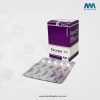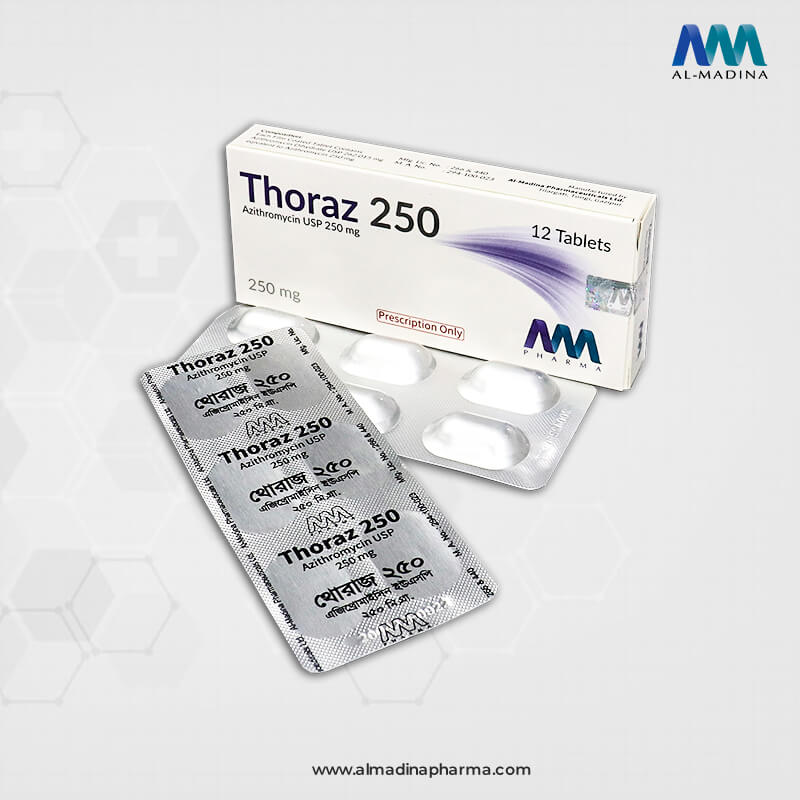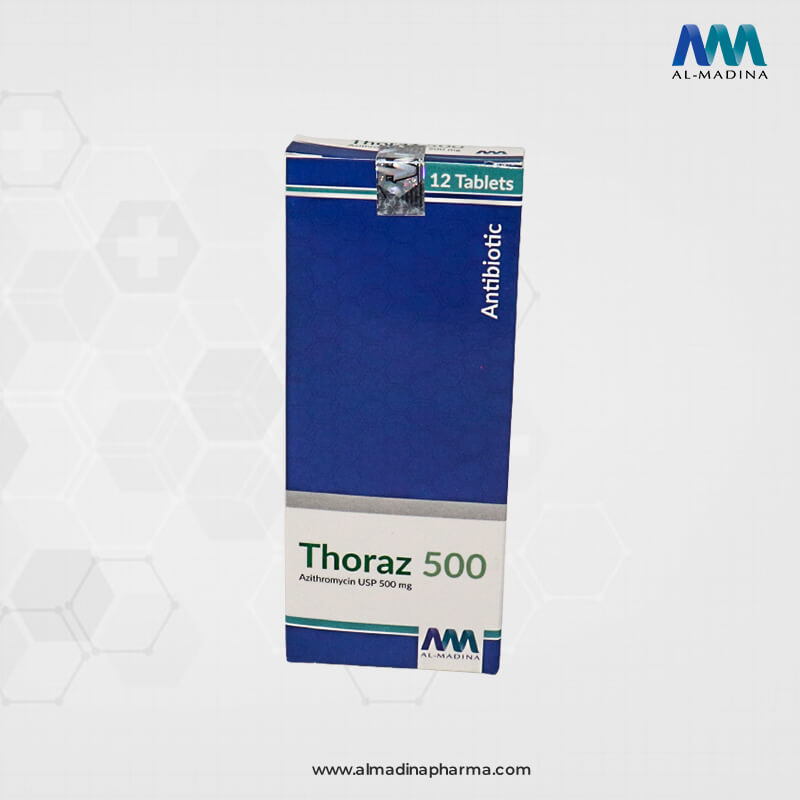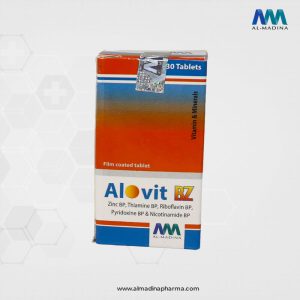Thoraz
৳ 300 – ৳ 384
Brand Name: Thoraz
Generic Name: Azithromycin dihydrate USP
Therapeutic Class: Antibiotic
- Additional information
- Presentation
- Description
- Indication
- Dose And Administration
- Side Effects
- Warning & Precaution
- Contraindication
- Use In pregnancy And Lactation
- Packaging
- Drug Interaction
- Overdose
- Reviews (0)
Additional information
| STRENGTH | 250mg, 500mg |
|---|
Presentation
Thoraz 500 Tablet : Each tablet contains Azithromycin dihydrate USP 524.03 mg equivalent to Azithromycin 500 mg.
Thoraz 250 Tablet: Each tablet contains Azithromycin dihydrate USP 262.015 mg equivalent to Azithromycin 250 mg.
Thoraz Powder for Suspension: Each 5 ml reconstituted suspension contains Azithromycin USP 209.65 mg as Azithromycin dihydrate 200 mg.
Description
Thoraz (Azithromycin) is an Azalide, derived from the macrolide class of antibiotics. It demonstrates activity in vitro, against a wide range of gram-positive and gram-negative bacteria including staphylococcus aureus, streptococcus pneumonia. The action of azithromycin is generally bacteriostatic except for selected pathogens. It is bactericidal for streptococcal pyogenes, streptococcal pneumoniae and H. influenzae. Azithromycin acts by binding to the 50s ribosomal subunit of susceptible organisms and thus interferes with microbial protein synthesis. Macrolides readily penetrate into leukocytes and tissue macrophages. Unlike other macrolides its ability to cross the outer membrane of select gram-negative species means that it can inhibit a number of aerobic and anaerobic gram-negative bacilli (e.g. Haemophilus influenzae and certain enterobacteriaceae) that have not been considered to be susceptible to macrolides. It is also active against intracellular pathogens such as mycoplasmas and Chlamydia and legionella species.
Indication
Thoraz (Azithromycin) is indicated for infections caused by susceptible organism e.g. in lower respiratory tract infection including bronchitis and pneumonia, skin and soft tissue infections, otitis media and in upper respiratory tract infections including sinusitis and pharyngitis/tonsillitis. In sexually transmitted diseases in men and women, Thoraz is indicated in the treatment of uncomplicated genital infections due to Chlamydia trachomatis
Dose And Administration
Adults: For lower respiratory tract infection including bronchitis and pneumonia, upper respiratory tract infections including sinusitis and pharyngitis/ tonsillitis otitis media and skin and soft tissue infections, the total dose of Azithromycin is 1.5 gm given as 500 mg once daily for 3 days. An alternative to this dosage schedule is that 500 mg once daily 1, followed by 250 mg once daily for next 4 days. For sexually transmitted diseases the dose of Azithromycin is 1 gm. given as a single dose. Alternatively, 500 mg once daily on day 1 followed by 250 mg once daily for next 2 days may also be given.
Side Effects
a) Common: Azithromycin is usually well tolerated. Most common side effects include nausea, vomiting, abdominal discomfort (pain/cramps), flatulence, diarrhea, headache, dizziness.
b) Rare: skin rashes and are reversible upon discontinuation of therapy.
Warning & Precaution
As liver is the principal route of excretion of azithromycin, it should not be used in patients with hepatic disease. Avoid concomitant administration with terfenadine or astemizole. Precaution should be taken in patients with more severe renal impairment.
Contraindication
Azithromycin is contraindicated in patient with a known hypersensitivity to azithromycin or any of the macrolide antibiotics. Because of the theoretical possibility of ergotism, azithromycin and ergot derivatives should not be co-administered.
Use In pregnancy And Lactation
Recent clinical studies have recommended that Azithromycin should be considered for the initial treatment of chlamydial cervicitis in pregnancy. In other infections, Azithromycin should be used only when clearly needed. It is not known whether azithromycin is excreted in breast milk. Exercise caution when administering to nursing women.
Packaging
Thoraz 250 & 500Tablet: Each box contains 2 X 6’s Tablet.
Thoraz Powder for Suspension: Bottle containing powder to make 20ml & 35 ml oral suspension.
Drug Interaction
a) With medicine: Interactions with Antacids: In patients Azithromycin and antacids, Azithromycin should be taken at last 1 hour before or 2 hours after the antacids.
Interactions with Cyclosporine: Some of the related macrolide antibiotics interfere with the metabolism of cyclosporine. So caution should be exercised before co-administration of these two drugs. Interactions with Ergot derivatives: Because of the theoretical possibility of ergotism, concomitant administration of ergot derivatives and Azithromycin should be avoided.
b) With Food and others: Grapefruit and azithromycin are both broken down the same way by the liver, so interactions are possible, although they are thought to be uncommon. To be safe, avoid all grapefruit products while taking this drug.
Overdose
This may cause liver damage and irregular heart rhythm.






















Reviews
There are no reviews yet.